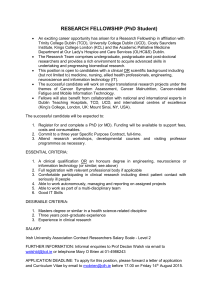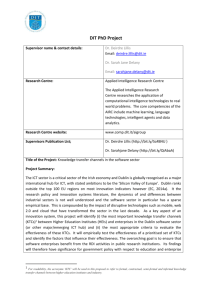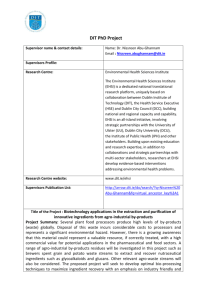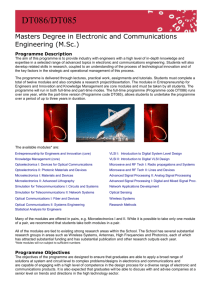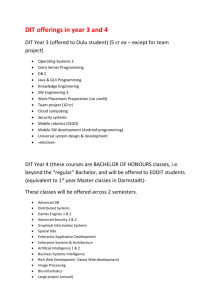doc - Higher Education Authority
advertisement
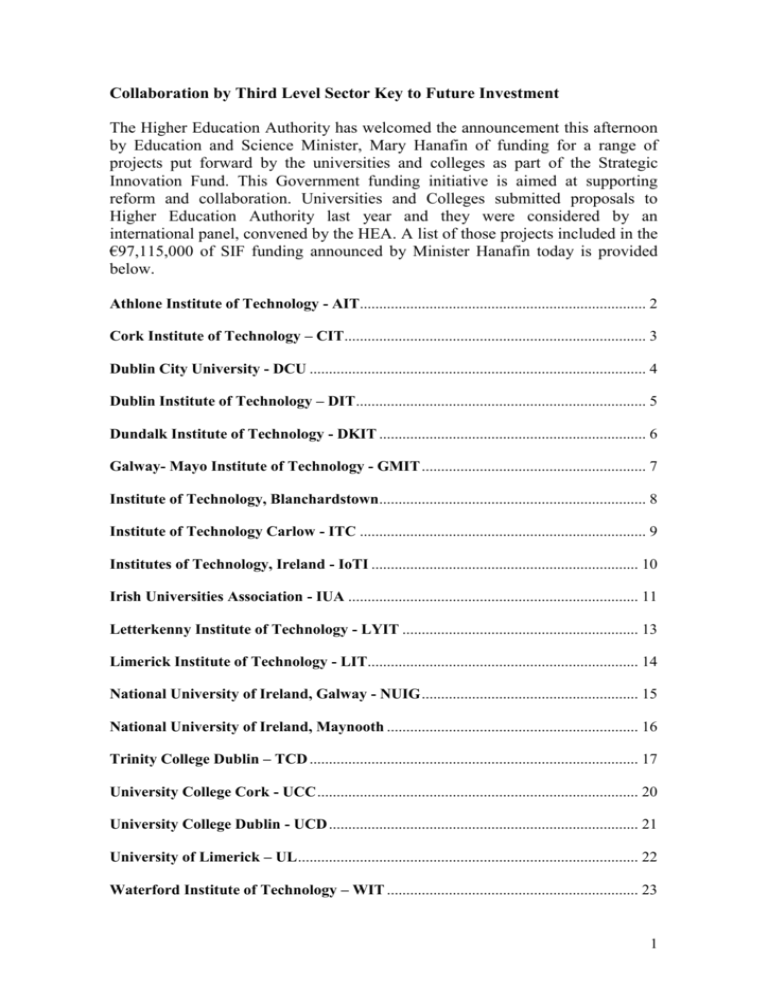
Collaboration by Third Level Sector Key to Future Investment The Higher Education Authority has welcomed the announcement this afternoon by Education and Science Minister, Mary Hanafin of funding for a range of projects put forward by the universities and colleges as part of the Strategic Innovation Fund. This Government funding initiative is aimed at supporting reform and collaboration. Universities and Colleges submitted proposals to Higher Education Authority last year and they were considered by an international panel, convened by the HEA. A list of those projects included in the €97,115,000 of SIF funding announced by Minister Hanafin today is provided below. Athlone Institute of Technology - AIT.......................................................................... 2 Cork Institute of Technology – CIT.............................................................................. 3 Dublin City University - DCU ....................................................................................... 4 Dublin Institute of Technology – DIT ........................................................................... 5 Dundalk Institute of Technology - DKIT ..................................................................... 6 Galway- Mayo Institute of Technology - GMIT .......................................................... 7 Institute of Technology, Blanchardstown..................................................................... 8 Institute of Technology Carlow - ITC .......................................................................... 9 Institutes of Technology, Ireland - IoTI ..................................................................... 10 Irish Universities Association - IUA ........................................................................... 11 Letterkenny Institute of Technology - LYIT ............................................................. 13 Limerick Institute of Technology - LIT...................................................................... 14 National University of Ireland, Galway - NUIG ........................................................ 15 National University of Ireland, Maynooth ................................................................. 16 Trinity College Dublin – TCD ..................................................................................... 17 University College Cork - UCC ................................................................................... 20 University College Dublin - UCD ................................................................................ 21 University of Limerick – UL ........................................................................................ 22 Waterford Institute of Technology – WIT ................................................................. 23 1 Lead Funding Partners A: Widening Participation 1. Regional Assistive Technology Connection to Higher Education (REACH) €238,000 LYIT Total €238,000 Athlone Institute of Technology - AIT Athlone Institute of Technology (AIT), in partnership with Letterkenny IT (LYIT), has been successful in securing funding for the Regional Assistive Technology Connection to Higher Education (REACH) project. AIT has exercised leadership combined with commitment to Disability Access for over 13 years and has in the present academic session approximately 100 students with varying degrees of Special Learning Difficulty (SLD) enrolled i.e., approximately 2.6% of its student body, which is more than twice the national average. This project aims to increase equity of access, participation and progression to Higher Education. The initiative fits strategically with the aims of the Regional Assessment and Resource Centre project funded under SIF 1, and led by AIT. 2 Cork Institute of Technology – CIT A: Widening Participation Lead Funding Partners 1. Roadmap for Employer-Academic Partnership (REAP) €4,205,000 DIT, WIT, ITTD, UCC, ITS, AIT, NUIG Total €4,205,000 CIT’s project proposal: Roadmap for Employer-Academic Partnership (REAP) was also allocated funding under SIF 2. The partners involved in this are DIT, WIT, ITTD, UCC, ITS, AIT, NUIG. The aim of the project is facilitate the research, development and validation of a Higher Education / Employment Partnership Model and Roadmap. It will identify learning needs within workplaces, draw up a comprehensive plan for partnership between employers and HEI’s, and verify the effectiveness of the strategy through a diverse range of demonstrator collaborative activities. It will provide the gateway to integrate and rationalise complementary initiatives and offer a single simple, relevant, inclusive framework to facilitate interaction with the workplace. 3 Lead Funding Partners 1. DRHEA - Enhancement of Learning €21,640,000 UCD, NUIM, TCD, DIT, ITB, ITTD, IADT Total €21,640,000 Dublin City University - DCU B: Teaching & Learning The Higher Education sector in the Dublin region includes four universities and their linked Colleges (TCD, UCD, DCU, NUIM) and four Institutes of Technology (DIT, IADT, ITB, ITT Dublin). These institutions are now coming together to establish the Dublin Region Higher Education Alliance (DRHEA). For this round of the Strategic Innovation Fund the eight members of the Alliance have identified four strands of activity where there is an immediate need for resources to enable collaborative actions. The DRHEA proposal is an integrated collaborative programme of work addressing these challenges as a system rather than as individual institutions. Dublin City University (DCU) has been awarded funding as part of the DRHEA alliance for an Enhancement of Learning strand. This strand comprises four major projects including the establishment of the Dublin Centre for Academic Development (DCAD). Each project concerns different aspects of enhancing learning: reforming the curriculum, teaching for engagement and retention, Elearning, and supporting the learner. The DCAD will bring together new and existing academic development expertise from participating institutions to create academic training and development resources. It will be a network of academic leaders and academic development professionals, embedded in the Faculties and Schools of each institution, but linked and networked across the Alliance, delivering a step-change in the capacity for educational innovation. 4 Dublin Institute of Technology – DIT A: Institutional Restructuring 1. Restructuring and Change Management Total Lead Funding Partners €4,385,000 WIT, CIT €4,385,000 DIT, in partnership with WIT and CIT, has been awarded funding for its Institutional Restructuring project, Strategic Management and Change. In this project, 3 of the largest IoTs will collaborate to evaluate and manage mission critical issues such as funding, evolving market opportunities and organization development (They are acting as a pilot for all institutions). This project incorporates a number of strands and identified initiatives to address issues common to the partner institutions. These include shift in demographics and competition, the impact of the movement to HEA funding and actions needed as a result of the recommendations from the NDP and SSTI such as widening participation, increasing student and graduate numbers, reform and modernisation of programme delivery with a view to achieving world-class quality in higher education. The experience gained by this partnership could provide useful models for other institutions facing similar challenges. 5 Lead Funding Partners 1. Creating the Entrepreneurial Graduate €1,988,000 ITB, CIT, SIT, NUIG. Total €1,988,000 Dundalk Institute of Technology - DKIT A: Teaching & Learning Dundalk Institute of Technology (DkIT), in partnership with, Blanchardstown IT, Cork IT, Sligo IT and NUI Galway, has been awarded funding for its Creating the Entrepreneurial Graduate proposal. This proposal aims to embed entrepreneurship education into existing technology programmes, and effect organisational change within and between the institutions. It is intended that the programmes will reflect entrepreneurial processes involving collaboration between the academic Schools and Departments, incubation and technology transfer offices. 6 Galway- Mayo Institute of Technology - GMIT A: Teaching & Learning 1. Student Leadership - Student Led Learning 2. Student Leadership - Curriculum Reform Total Lead Funding Partners €1,498,000 €551,000 AIT NUIG €2,049,000 The Galway-Mayo Institute of Technology (GMIT), in collaboration with AIT and NUI Galway, has been allocated funding for two strands under its Student Leadership scheme: Student Led Learning ( with AIT) This project is centred on students’ engagement in their learning, their impact on the change agenda of the participating institutes and their longer-term leadership role. This project focuses on: 1. greater engagement of students in the process of their learning; 2. improved student decision making in a modular framework; 3. improved retention. Curriculum Reform (with NUIG) This strand aims to design a model for continuous curriculum development at institutional, programme and modular level. This collaboration between GMIT and NUI, Galway will focus on the practical aspects of the implementation of Bologna and the national qualifications framework (NQF) in the two institutions. The collaborators have different experiences and emphases to date and the focus will be on curricular reform and the related quality imperatives. Joint peer review of activities and learning from other sectoral partners will be an inherent part of the strand. Modularisation is a key strategic objective of GMIT and this project enables the institute to complete this transformation. 7 Lead Funding Partners 1. ERA – Transitions €515,000 DKIT, ITTD, ITC Total €515,000 Institute of Technology, Blanchardstown A: Widening Participation The Institute of Technology Blanchardstown (ITB) is leading on the Eastern Regional Alliance Access project: ‘Transitions’. This project is in partnership with Institute of Technology Carlow (ITC), Dundalk Institute of Technology (DKIT) and Institute of Technology Tallaght, Dublin (ITTD). It will draw on research and local experience to date about the concept of ‘readiness’ for College, and position this within both social and academic frameworks. It will thus address a significant part of the retention and 8 Institute of Technology Carlow - ITC Lead Funding Partners €1,460,000 DKIT, ITTD, ITB A: Widening Participation 1. ERA - Consolidating Services for increased capacity B: Teaching & Learning 2. ERA - Repositioning Learner Assessment Total €579,000 €2,039,000 DKIT, ITTD, ITB Institute of Technology Carlow (ITC) is the lead institute in the Eastern Regional Alliance (ERA) access project: Consolidating Services for increased capacity. The other institutes involved are ITB, ITTD, and DKIT. This project strand will provide significant support for activities which promote balanced regional, economic, and social development. It aims to increase the number of flexible programmes offered to meet the needs of lifelong learners and aid in overall learner retention. The programme will also research diverse regional needs, and in so doing, allow ERA Institutes to anticipate both labour market demands and individual learner needs. Institute of Technology, Carlow, in collaboration with DKIT, ITB and ITTD, has been granted funding for its Repositioning Learner Assessment project. This project aims to transform thinking about, and practices of assessment across the partnership and the sector. The proposal is a response to growing concerns throughout the IoT sector about a set of new assessment issues including: a) Linking learning outcomes, teaching and evidence-based assessment practices b) Grading and assurance of academic standards c) Feedback to learners & use of formative and summative assessment d) Learners entering with low prior academic achievement e) Larger class sizes and assessment of group learning f) International learners unfamiliar with Irish assessment methods g) Use of technology in assessment. 9 Lead Funding Partners €8,523,000 All IoTs and DIT B: Post Graduate Capacity 1. Addressing the Needs of the Knowledge Economy Research Coordination & Support Office - Research Capacity €1,438,000 All IoTs and DIT Total €9,961,000 Institutes of Technology, Ireland - IoTI A: Widening Participation 1. Addressing the Needs of the Knowledge Economy - Supported Flexible Learning The Institutes of Technology Sector, facilitated by Institutes of Technology Ireland (IoTI), has been approved for funding for two programmes under SIF II. The first Institutes of Technology, Ireland’s (IoTI) proposal aims to Address the Needs of the Knowledge Economy. The Lifelong Learning/Up skilling strand - Supported Flexible Learning was successful at this stage of SIF 2. The proposal involves partnerships between all Institutes of Technology and DIT. In keeping with current government and market need, the IoT’s and DIT commit to mainstreaming supported flexible learning within and between their institutes as an innovative and complementary mode of delivery. This flexible learning system aims to expand the number of people in the workforce engaged in education and development. The second Institutes of Technology Ireland (IoTI) have been awarded funding for an Institute of Technology sectoral proposal entitled Addressing the Needs of the Knowledge Economy - Research Coordination & Support Office: Research Capacity. The collaborating institutions are developing a strategic framework for planned growth of research in the sector, and a roadmap for the development of the knowledge triangle of education, research and innovation. There are major challenges facing the IOTs and DIT in embedding a research culture and in growing their capacity for research, in line with their own strengths, and institutional and national strategies. A Research Co-ordination and Support Office for the IoTs and DIT will be established to enable issues to be addressed and targets met. 10 Irish Universities Association - IUA A: Widening Participation 1. Equity of Access B: Institutional Restructuring 1. Sectoral Human Resource Capacity Building 2. Full Economic Costing 3. Building Strategic Information/Decision Support Capacity C: Post Graduate Capacity 1. Towards an Integrated Knowledge Transfer Platform 2. Access to Irish National Bibliometric Data Total Lead Funding Partners €415,000 All Universities €382,000 €1,891,000 €2,200,000 €221,000 €350,000 €5,459,000 The University Sector, facilitated by the Irish Universities Association (IUA), has been approved for funding for six programmes under SIF II. This sectoral access project (including all universities and the DIT), Equity of Access has been awarded funding under SIF II. The project aims to build on the outputs from the IUA-SIF 1 Project (Widening the base for High Quality Student Recruitment). It will implement nationally-agreed indicators of educational disadvantage and utilize these to accurately direct pre-entry, admission and postentry activities at those students and communities most marginalised terms of access to Higher Education. It will formalise and quantify systems and approaches to access. The new structured approach involves a radical overhaul of the existing access system. Sectoral Human Resource Capacity Building. This project, in concert with the outcomes of the SIF Cycle I Leadership Project, aims to enable the full development of the Leadership Academy and add value through building the capacity of the sector to more effectively manage and plan for Human Resources Development. The process of restructuring/modernising the universities has significant implications for Human Resources management, impacting on strategic, structural and stakeholder relations dimensions. Each University will identify and develop areas of expertise/excellence, which will be cascaded through a sector-wide network of HR experts. The momentum established by the process will be sustained into the future by the Leadership Academy which will have an ongoing responsibility to support HR and Organisational Development activities, including management development, performance indicators and performance management. Full Economic Costing (restructuring) This project builds on the SIF Cycle I initiative which scoped a Full Economic Costing Model (FEC). This project will implement that model and allow quantification and analysis of the full costs of Teaching, Research and other 11 activities. Implementation of FEC will: 1. Bring greater transparency to costing university activity; 2. Assist strategic resource deployment; 3. Ensure recovery of research overheads. Building Strategic Information (restructuring) This proposal builds on SIF Cycle I projects to establish key performance indicators for the universities, together with associated data models. The outputs of these projects are a “superset” of sectoral performance indicators, more detailed institutional indicators, and the data models required to generate these. These are key enablers for institutional decision-making and essential for longterm university strategy. This SIF2 proposal will create the data-warehousing capability to extract relevant data from institutional systems to feed local/national performance indicators. It links with the FEC project (above) and is part of the strategic drive to effectively manage, plan, and deliver value for money, increased transparency in decision-making and resource allocation. Towards an Integrated Knowledge Transfer Platform (Graduate capacity) This project aims to enhance the accessibility of Irish research on the internet, making it less fragmented and better structured for the end user. Valuable experience in developing the IUA portal (www.expertiseireland.com) and the SIF1 Institutional Repositories Project will be used to solve current problems. The goal is to create a one-stop-shop to showcase and disseminate Irish publiclyfunded research to national and global audiences. Access to National Bibliometric Data (Graduate capacity) This project will further enhance the university infrastructure for individual institutional repositories that were initiated under SIF through the acquisition of internationally-recognised high-quality bibliometric datasets, supporting university and national research strategy and benchmarking activities. 12 Lead Funding Partners 1. North West Gateway Strategic Alliance €893,000 University of Ulster Total €893,000 Letterkenny Institute of Technology - LYIT A: Institutional Restructuring The LYIT led North West Gateway Strategic Alliance, involving the University of Ulster, has also been successful in securing funding. This proposal has two elements: a scoping study and a complete specification for a strategic alliance. The focus of the scoping study is to build a fuller picture of the opportunities for collaboration, the views of stakeholders, the needs of the North West Gateway region, the respective operating environments of the partner institutions and possible models for achieving the aims of the proposal. The scoping study will be the basis on which a complete specification for the strategic alliance will be based. This specification will address institutional strategies and missions, best practice in higher education collaboration and the question of additional capacity in the context of the national priorities including the objectives under SIF. 13 Lead Funding Partners €383,000 ITT, ITC 1. Shannon Consortium Strand 4. Library Network Support Services €495,000 UL, ITT, MIC Total €878,000 Limerick Institute of Technology - LIT A: Widening Participation 1. A Work-Based Learning approach to progression for craft persons on the National Framework of Qualifications B: Teaching & Learning Limerick Institute of Technology (LIT), in partnership with ITT and ITC, has been awarded funding for its SIF programme A Work-Based Learning approach to progression for craft persons on the National Framework of Qualifications. This project will address the needs of craft persons progressing to Level 7 and 8 on the National Framework of Qualifications, in a manner which suits their learning styles. The proposal asserts that there are over 28,000 craft apprentices currently registered and tens of thousands of craft persons in the workforce, qualified at Level 6. The IoTs with FAS are the major providers of Advanced Craft Certificate training and acknowledge their statutory obligation to provide for progression beyond the narrow base (licence to practise). This is particularly relevant in view of the imminent downturn in the construction sector; craft persons are a vulnerable group. LIT has also been granted funding for its part in the Shannon Consortium (UL, LIT, ITT and Mary Immaculate College) Strand 4 project - Library Network Support Services. The proposed Shannon Consortium network of libraries will share resources and expertise in order to plan, develop, integrate and evaluate a suite of Information Literacy modules and innovative support services. These will facilitate a blended and active learning approach across the range of existing and emerging student groups and abilities. These modules will help to develop information-literate students and provide them with the generic lifelong skills necessary to locate, evaluate and use information effectively. 14 Lead Funding Partners A: Institutional Restructuring 1. NUI Galway - GMIT Strategic Partnership (Knowledge Region) €824,000 GMIT Total €824,000 National University of Ireland, Galway - NUIG NUI Galway was awarded funding for its collaboration with GMIT in the NUI Galway - GMIT Strategic Partnership (Knowledge Region) project. This is a major initiative for NUIG, along with GMIT to develop the Galway area as a recognised ‘Knowledge Region’. The proposal involves engagement with the Region through a set of bilateral and sectoral projects, and aims to stimulate professional development and target regional research. The interaction of an educational institution with its region (especially with enterprise) can be complex and the interfaces can be viewed as cumbersome and sub-optimal. The objective of this project is to develop and grow an integrated model which aligns the capacity of the Institute with enterprise in order to make a significant contribution to regional development (structural), and to create the right environment for future substantive interaction (cultural). 15 National University of Ireland, Maynooth Lead Funding A: Institutional Restructuring 1. Internal Transformation Process and Systems Change- Data Information Systems for Strategic Decision Making €320,000 Total €320,000 Partners NUI Maynooth’s project proposal for Internal Transformation Process and Systems Change, had several strands. Strand one – Data Information Systems for Strategic Decision Making has been approved for funding. This project builds on the SIF1 project, which aimed to provide timely, reliable and comparative data for strategic planning and decision making by the leaders of the University. It set out to provide a range of Key Performance Indicators across a number of domains that will subsequently be linked to data warehouses and/or specially commissioned surveys. This funding will enable NUIM to create an institutional research capacity to transform data into information that will enhance the quality of strategic decision making and also enable a better integration of planning, and quality assurance. 16 Trinity College Dublin – TCD Lead Funding Partners A: Widening Participation €410,000 UCD, NUIM, DCU, DIT, ITB, ITTD, IADT NUIG, UCC, DKIT 1. C4 – Continuing Institutional Reform €1,700,000 UCD, UCC, NUIG C: Teaching & Learning 1. Deaf Studies 2. Certificate in Contemporary Living €1,471,000 €885,000 ITB UCC Total €7,029,000 1. DRHEA - Widening Participation 2. Online Mental Health €2,563,000 B: Institutional Reform The Higher Education sector in the Dublin region includes four universities and their linked Colleges (TCD, UCD, DCU, NUIM) and four Institutes of Technology (DIT, IADT, ITB, ITT Dublin). These institutions are now coming together to establish the Dublin Region Higher Education Alliance (DRHEA). For this round of the Strategic Innovation Fund the eight members of the Alliance have identified four strands of activity where there is an immediate need for resources to enable collaborative actions. The DRHEA proposal is an integrated collaborative programme of work addressing these challenges as a system rather than as individual institutions. DRHEA - TCD This DRHEA strand is an integrated collaborative programme of work addressing learning challenges as a system. The underpinning innovation is the foundation of the Dublin Centre for Academic Development (DCAD). This virtual centre will bring together new and existing academic development expertise from the participating institutions, to create academic training and development resources, and a management committee of the relevant specialist staff to co-ordinate the work programmes. The DRHEA will also establish a Higher Learning Network (HLN) to link all DRHEA institutions with other education providers across the greater Dublin region. Taking account of the current challenges in the Dublin City Region, initial efforts will focus on the needs of adult learners who wish to enter or progress further in higher education, and for the diverse ethnic communities who now live in our city and wish to access higher education or add to qualifications gained in their native countries. Trinity College Dublin (TCD), in partnership with NUIG, DKIT, and UCC, has been allocated funding for its Online Mental Health proposal. Using innovation technologies, this portal will improve access to mental health services and psycho-educational supports for an increasingly diverse student population 17 (mature, ethnic minority, traveller, disabled, socially disadvantaged, gay, lesbian and bisexual students). It will also validate new interventions as students use the internet to access mental health education resources and other supports. It will develop effective, evidence-based and relevant mental health services for students. TCD is the lead institution in the Continuing Institutional Reform Project. This is a C4 collaboration with UCD, UCC and NUIG involved. The C4 Group programme of work is structured to take advantage of the scale, structure and national coverage of the participating institutions and the wider national communities they serve. The Group recognises that management and governance systems must be significantly reformed and updated to effectively employ their resources to respond to the complex demands of the global education environment. Following from the support provided by SIF I which enabled the institutions to reshape their academic management and governance structures, the C4 Group has now rationalised their academic departments into Schools governed by new Faculty structures with Executive Deans, and they have devolved budgets and decision-making. Having reformed their academic structures, they are now reforming their administrative and support services to underpin core activities. In particular, the Group plan to reallocate existing resources and provide additional resources to the new Faculties to improve their organisational cohesion and service delivery in teaching, learning and research, to increase undergraduate and postgraduate student numbers, and to source other means of funding. Deaf Studies (in collaboration with ITB) The Centre for Deaf Studies exists as a pilot project until 30 September 2008. The Centre for Deaf Studies at Trinity has developed diploma courses to improve education and career opportunities for deaf students. This proposal will make these diploma courses available nationwide, it will implement a BA degree option, and it will research, develop, implement and evaluate appropriate assistive technologies for the teaching of Irish Sign Language (ISL) and Deaf Studies via the internet. Certificate in Contemporary Living (in collaboration with UCC) The National Institute for Intellectual Disability (NIID) in Trinity has pioneered the highly acclaimed and innovative CCL course for students with intellectual disability. It comprises ten modules that cover the areas of liberal arts, expressive arts, career development and vocational skills. SIF funding will support the CCL and its cohort of students to create greater capacity in its research and policy development activities including study of access to quality third level education for people with intellectual disability throughout Ireland and the development, implementation and dissemination across Ireland of best practice in life long learning for people with intellectual disability. 18 The programme is recognised as resource intensive and SIF support has been provided to enable the NIID to further develop a sustainability strategy for the programme. 19 Lead Funding Partners €2,314,000 €574,000 CIT CIT, TCD 1. C4 - Developing Infrastructure (Enabling 4th level Ireland: Development of Graduate Studies) €2,125,000 UCD, NUIG, TCD Total €5,013,000 University College Cork - UCC A: Widening Participation 1. Bridges to learning 2. Connections B: Post Graduate Capacity University College Cork (UCC), in collaboration with CIT, NUIG, TCD and UCD, has been allocated funding for three SIF II programmes. Bridges to Learning is a partnership project for inclusive higher education in the southern region between UCC and CIT (incorporating its associated Colleges and Schools). This strand focuses on schools, community-based groups, and voluntary/statutory agencies, and is designed to raise educational aspirations. It seeks to increase the number of disadvantaged and mature students accessing science and technology programmes. Both institutions will also collaborate with TCD Centre for Deaf Studies, and UCC alone will work with TCD’s Certificate in Contemporary Living. The Connections project aims to provide a model for regional partnerships to deliver on the National Access agenda. The project will also help to inform national access and widening participation policy by reviewing and evaluating data from collaborating institutions, analysing data of ‘what works’, and supporting the social dimension of higher education under the Bologna process. The partnership will link with regional networks in Dublin, Galway, Limerick and Waterford. UCC, in collaboration with NUIG, has also been allocated funding for its Developing Infrastructure (Enabling 4th level Ireland: Development of Graduate Studies) project. This project involves 3 steps: 1) a further inter-institutional expansion of PhD supervisory capacity; 2) support for programmes for new academic staff to enhance research activity and postgraduate supervisory skills; 3) devolution of academic functions relating to graduate education through establishment of an administrative Graduate School infrastructure. 20 Lead Funding Partners DRHEA - Graduate Education €15,276,000 NUIM, TCD, DCU, DIT, ITB, ITTD, IADT Total €15,276,000 University College Dublin - UCD A: Post Graduate Capacity The Higher Education sector in the Dublin region includes four universities and their linked Colleges (TCD, UCD, DCU, NUIM) and four Institutes of Technology (DIT, IADT, ITB, ITT Dublin). These institutions are now coming together to establish the Dublin Region Higher Education Alliance (DRHEA). For this round of the Strategic Innovation Fund the eight members of the Alliance have identified four strands of activity where there is an immediate need for resources to enable collaborative actions. The DRHEA proposal is an integrated collaborative programme of work addressing these challenges as a system rather than as individual institutions. The Dublin Regional Higher Education Alliance (DRHEA) has been granted funding for its Graduate Education proposal. This project has 4 aims: 1) Increase capacity in graduate education efficiently through collaborative delivery; 2) Enhance the quality of doctoral education with improved structures and provision of advanced taught courses; 3) Catalyse the development of a wide-range of inter-institutional graduate programmes in the Dublin City region; 4) Provide graduate education at the highest international standard to support competitive recruitment of the best international students, while retaining the best Irish students. 21 University of Limerick – UL A: Widening Participation Lead Funding Partners 1. Shannon Consortium - Regional Learning Centres €2,017,000 2. Shannon Consortium - Targeting Social Disadvantaged B: Institutional Restructuring €3,816,000 LIT, ITT, MIC LIT, ITT, MIC €473,000 LIT, ITT, MIC €3,240,000 LIT, ITT, MIC 1. Shannon Consortium Procurement Network C: Teaching & Learning 1. Shannon Consortium - Regional Teaching and Learning Incubation Centre 2. Shannon Consortium - National Centre for Excellence in Maths and Science T&L Total €2,954,000 €12,500,000 The University of Limerick under the Shannon Consortium umbrella (including UL, LIT, ITT, Mary Immaculate) has had two successfully approved Access projects under the Regional Learning Centres and Targeting Social Disadvantaged proposal. The Regional Learning Gateway was established in SIF Cycle 1 but will now be extended to Clare and Kerry. Interventions for younger learners will focus on socio-economically disadvantaged areas in Limerick plus a disadvantaged area in Tralee. The consortium aims to work with specific cohorts of learners in primary and secondary schools with a view to achieving a longterm impact. Targeting Social Disadvantage, the Shannon Consortium will bring its services to disadvantaged areas in the region over the three-year period 2008-2010. The aim is to engage with schools, community groups and relevant statutory agencies connected to those areas, initially in Limerick and subsequently in Tralee. The proposal has three clearly identified projects: (1) developing a new educational landscape; (2) students supporting students; and (3) the Class of 2014. The University of Limerick is also the lead on the Shannon Consortium Procurement Network Project where LIT, ITT and MIC are the partner institutions. The aim of this project is to increase efficiency behind the scenes by streamlining services, thereby providing further indirect benefits for students and staff. A procurement shared services network will be developed for the institutions involved. University of Limerick (UL) has been allocated funding for two projects in the Shannon Consortium strand, Innovation in Teaching and Learning Support: A new Teaching and Learning Incubation Centre will be established which will foster continuous innovation by faculty members. A new National Centre for Excellence in Mathematics and Science Teaching and Learning will be established to build on the outcomes of the Cycle 1 project and to further support teaching and learning in these important areas. 22 Waterford Institute of Technology – WIT A: Post Graduate Capacity 1 Creating a Sustainable Environment for Knowledge Transfer in Undergraduate and Postgraduate Education and Research Establishing the governance and management structures & Scope and assessment 2. Creating a Sustainable Environment for Knowledge Transfer in Undergraduate and Postgraduate Education and Research - Doctoral Programme Development B: Teaching & Learning 1. Creating a Sustainable Environment for Knowledge Transfer in Undergraduate and Postgraduate Education and Research Structural & Curriculum Change Total Lead Funding Partners €721,000 UCC, CIT €607,000 UCC, CIT €575,000 UCC, CIT €1,903,000 Waterford Institute of Technology (WIT), in collaboration with CIT and UCC, has been allocated funding for two projects under the overall Creating a Sustainable Environment for Knowledge Transfer scheme as follows: Establishing the governance and management structures This will establish the overall management structure for the programme and assign roles and responsibilities for the project to participants. An objective is to maximise the extent of information and best practice sharing between the partners and to ensure that the SIF proposal of each partner is complementary. The project will assess and design new structures and a new curriculum to build knowledge transfer opportunities. It will also research best international practice in linking research, teaching, learning and knowledge transfer and compare it to the current practices in the partner institutions. Doctoral programme development This proposal aims to create a common structure for the professional doctorate across distinct areas - business, computing and engineering - within WIT and CIT. It will create the opportunity for inter-institutional learning and sharing of resources. UCC has a number of practice and professionally orientated doctoral awards. As such, they are effective advisors in this process and can provide review and reflection on the proposed outputs and outcomes from this programme. Creating a Sustainable Environment for Knowledge Transfer in Undergraduate and Postgraduate Education and Research scheme for its proposal, Structural & Curriculum Change. The proposed model of structural and curriculum change will be implemented so as to allow the partners (and other institutions) select relevant outputs and transfer them into their own institution. The sharing of information and the co-development of the structures, processes and quality framework will allow the WIT experience to serve as a pilot, facilitating faster roll-out in other institutions. 23
